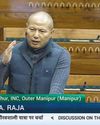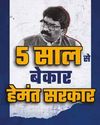
Jawaharlal Nehru is back in the Lok Sabha. He may have passed away nearly sixty years ago, but his ghost haunts India’s political discourse. The first prime minister and his legacy are often at the centre of today’s political debates. Depending on who he is invoked by, such references are rooted in either pride or derision. This current preoccupation with Nehru requires some explanation.
Today, Nehru is understood, for better and for worse, as the architect of independent India. Rather than taking this moniker for granted, let us ask what it means. Professional architects, even starchitects such as Zaha Hadid or Balkrishna Doshi, have to do a lot of negotiating: they have to reach compromises with clients and neighbours, with regulators and labourers. The end product bears the imprint of the architect’s imagination, but it is born of collaboration. When “architect” is used as a metaphor for Nehru, it implies that the man had a vision for the future of the country—drawn up in his preferred blueprint, the five-year plan—and that he worked to implement that vision, fairly unimpeded, labouring in relative isolation.
Bu hikaye The Caravan dergisinin May 2023 sayısından alınmıştır.
Start your 7-day Magzter GOLD free trial to access thousands of curated premium stories, and 9,000+ magazines and newspapers.
Already a subscriber ? Giriş Yap
Bu hikaye The Caravan dergisinin May 2023 sayısından alınmıştır.
Start your 7-day Magzter GOLD free trial to access thousands of curated premium stories, and 9,000+ magazines and newspapers.
Already a subscriber? Giriş Yap

HOW TO SEE ART?
BN Goswamy's strategies of seeing

Bitter Crop
Ghana's cacao plantations in crisis

SURVEYORS OF DESTRUCTION
An atmosphere of fear persists in the wake of the Sambhal violence

SITE OF DECEIT
HOW THE ASI FORTIFIES HINDUTVA HISTORY

The Broken Pact
Minority legislators rue the erosion of the Constitution under the Modi government/

Hate by Proxy
How shadow accounts on Meta spread BJP propaganda in Jharkhand

Mob Mentality
How the Modi government fuels a dangerous vigilantism

RIP TIDES
Shahidul Alam’s exploration of Bangladeshi photography and activism

Trickle-down Effect
Nepal–India tensions have advanced from the diplomatic level to the public sphere

Editor's Pick
ON 23 SEPTEMBER 1950, the diplomat Ralph Bunche, seen here addressing the 1965 Selma to Montgomery March, was awarded the Nobel Peace Prize. The first black Nobel laureate, Bunche was awarded the prize for his efforts in ending the 1948 Arab–Israeli War.